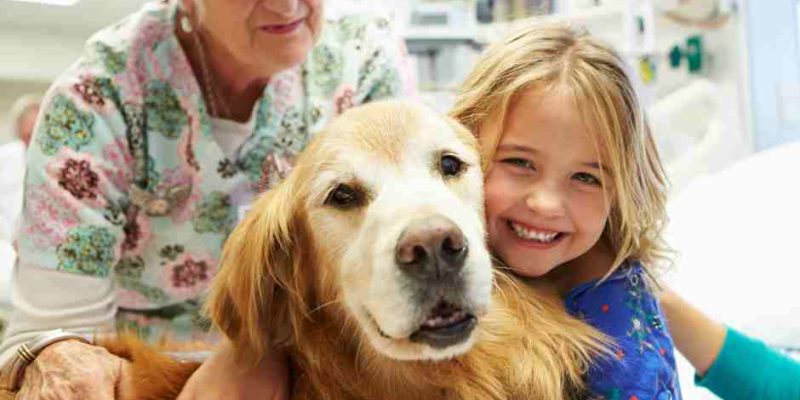Dogs are known for their ability to provide comfort and support to those in need, which is why they make excellent therapy dogs. If you have a dog that is friendly, obedient, and enjoys being around people, you may consider training them to be a therapy dog. Here are some tips on how to train your dog to be a therapy dog:
Choose the Right Dog
Not all dogs are suited for therapy work. Choose a dog that is friendly, calm, and well-behaved around people and other animals.
Page Menu
Here are some dog breeds that make good therapy dogs:
Golden Retrievers
Golden Retrievers are one of the most popular breeds for therapy work. They are friendly, obedient, and love to be around people. Their calm and patient nature makes them excellent at providing comfort and support to people in hospitals, nursing homes, and schools.
Labrador Retrievers
Labrador Retrievers are another popular breed for therapy work. They are gentle, friendly, and easy to train, which makes them a great choice for working with children and elderly individuals.
Poodles
Poodles are intelligent, loyal, and have a hypoallergenic coat, which makes them a great choice for therapy work with individuals who have allergies. They are also known for their calm and gentle nature, which makes them well-suited for working in hospitals and nursing homes.
Cavalier King Charles Spaniels
Cavalier King Charles Spaniels are known for their affectionate and gentle nature, which makes them great therapy dogs. They are also small in size, which makes them ideal for working with children and in confined spaces.
Bernese Mountain Dogs
Bernese Mountain Dogs are gentle giants that are well-suited for therapy work. They have a calm and patient nature and enjoy being around people. Their large size and sturdy build make them great for providing support and comfort to individuals in need.
Greyhounds
Greyhounds are known for their gentle and laid-back nature, which makes them great therapy dogs. They are also adaptable to different environments and enjoy being around people.
Newfoundland Dogs
Newfoundlands are gentle giants that are well-suited for therapy work. They are known for their calm and patient nature and their ability to provide comfort and support to people in need.
Socialize Your Dog
Socialization is key to training your dog to be a therapy dog. Expose them to different people, environments, and situations to help them develop confidence and good manners.
Basic Obedience Training
Your dog should have basic obedience training, including commands such as sit, stay, come, and leave it. This will ensure they are well-behaved and obedient when visiting different locations.
Specialized Training
Therapy dogs require specialized training to prepare them for their role. This may include training them to be comfortable with different types of people, such as children and elderly individuals, and different environments, such as hospitals and nursing homes.
Certification
Most therapy dog organizations require certification for your dog to become a therapy dog. Certification typically involves a test of your dog’s obedience and temperament.
Practice Visits Before beginning official therapy work,
Practice visits with your dog to different locations and with different people. This will help you both become more comfortable and confident in the role.
Maintain Your Dog’s Health
Regular veterinary checkups and maintaining your dog’s health are essential for therapy work. Your dog should be up-to-date on all vaccinations and parasite prevention.
In conclusion, training your dog to be a therapy dog requires patience, dedication, and specialized training. By choosing the right dog, socializing them, providing basic obedience training, specialized training, certification, practice visits, and maintaining their health, you can prepare your dog to become a comforting and supportive therapy dog.
With the proper training and certification, your dog can make a positive impact on the lives of others and become a valuable asset to your community.

